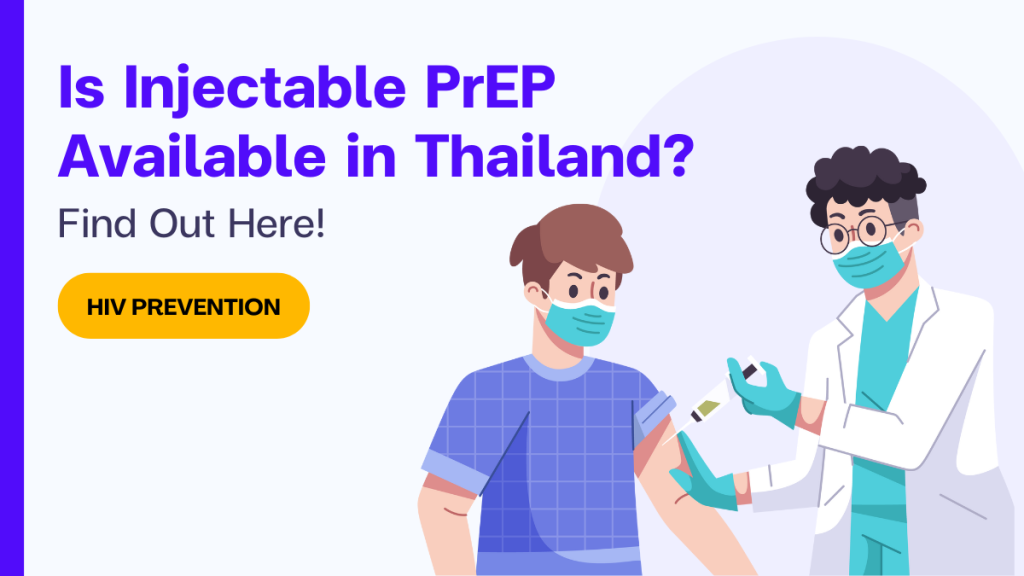In recent years, medical innovations have advanced rapidly, especially in the prevention of HIV infection. One of the latest breakthroughs is Injectable PrEP, or Cabotegravir Long-Acting (CAB-LA), a new, convenient, and highly effective option for HIV prevention. Currently, Injectable PrEP has been approved by the World Health Organization (WHO) and the U.S. Food and Drug Administration (FDA). But what is its status in Thailand? Is it accessible yet? This article will take you through the latest updates on Injectable PrEP in Thailand, along with the essential information you need to know!
What is Injectable PrEP ?
PrEP (Pre-Exposure Prophylaxis) is a medication that helps prevent HIV infection before exposure. Traditionally, PrEP comes in the form of daily oral pills. However, Injectable PrEP offers a more convenient alternative, as it only requires an injection every two months instead of taking pills daily.
What Medication is Used in Injectable PrEP

Injectable PrEP uses Cabotegravir Long-Acting (CAB-LA), an antiretroviral drug from the integrase inhibitor class. It is administered as an intramuscular (IM) injection every two months, following an initial dosing schedule where the first and second injections are given four weeks apart.
Key Features of Injectable PrEP
- Medication: Cabotegravir Long-Acting (CAB-LA)
- Administration: Intramuscular (IM) injection
- Dosing Frequency: First injection, followed by a second dose in 4 weeks, then every 2 months thereafter
- Effectiveness: Up to 99% protection against HIV
- Who is it for? Individuals who want to reduce the burden of daily pill-taking and seek long-term HIV prevention.
Advantages of Injectable PrEP
- Reduces the risk of missing doses
- Highly effective in preventing HIV
- Approved by WHO and FDA
Considerations for Injectable PrEP
- Limited availability in Thailand
- May be more expensive than Oral PrEP
- Requires clinic visits
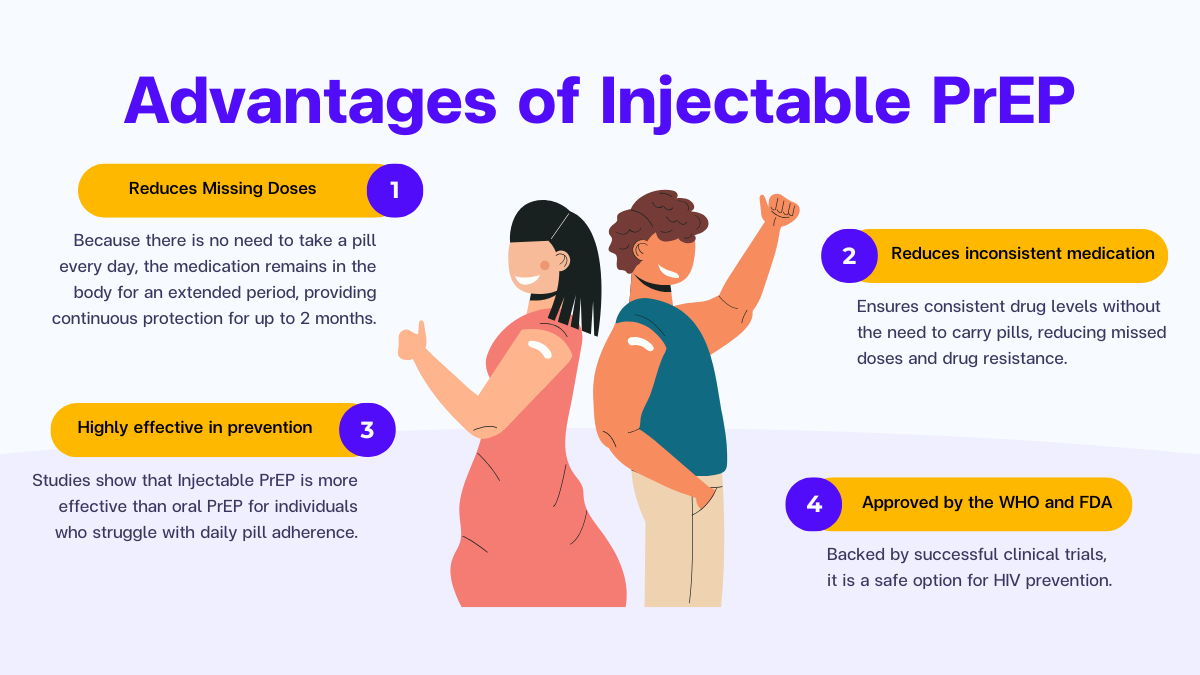
Who Should Consider Injectable PrEP?
Injectable PrEP (CAB-LA) is a convenient and highly effective option for HIV prevention. However, it may not be necessary for everyone. Here’s a look at who may benefit the most from this service.
| ➭ Men who have sex with men (MSM) |
| ➭ Transgender Women |
| ➭ HIV-positive partner |
| ➭ People who inject drugs and may share needles |
| ➭ Those who engage in sex without condoms regularly |
| ➭ Multiple partners and unknown HIV status |
| ➭ People with a history of sexually transmitted infections (STIs) in the past 6 months |
| ➭Anyone who struggles with daily pill intake and prefers a more convenient option |
Why Should Some People Choose Injectable PrEP Over Oral PrEP?
While oral PrEP is highly effective for preventing HIV, some individuals may struggle with taking a pill daily. Injectable PrEP offers a more convenient alternative, especially in the following situations:
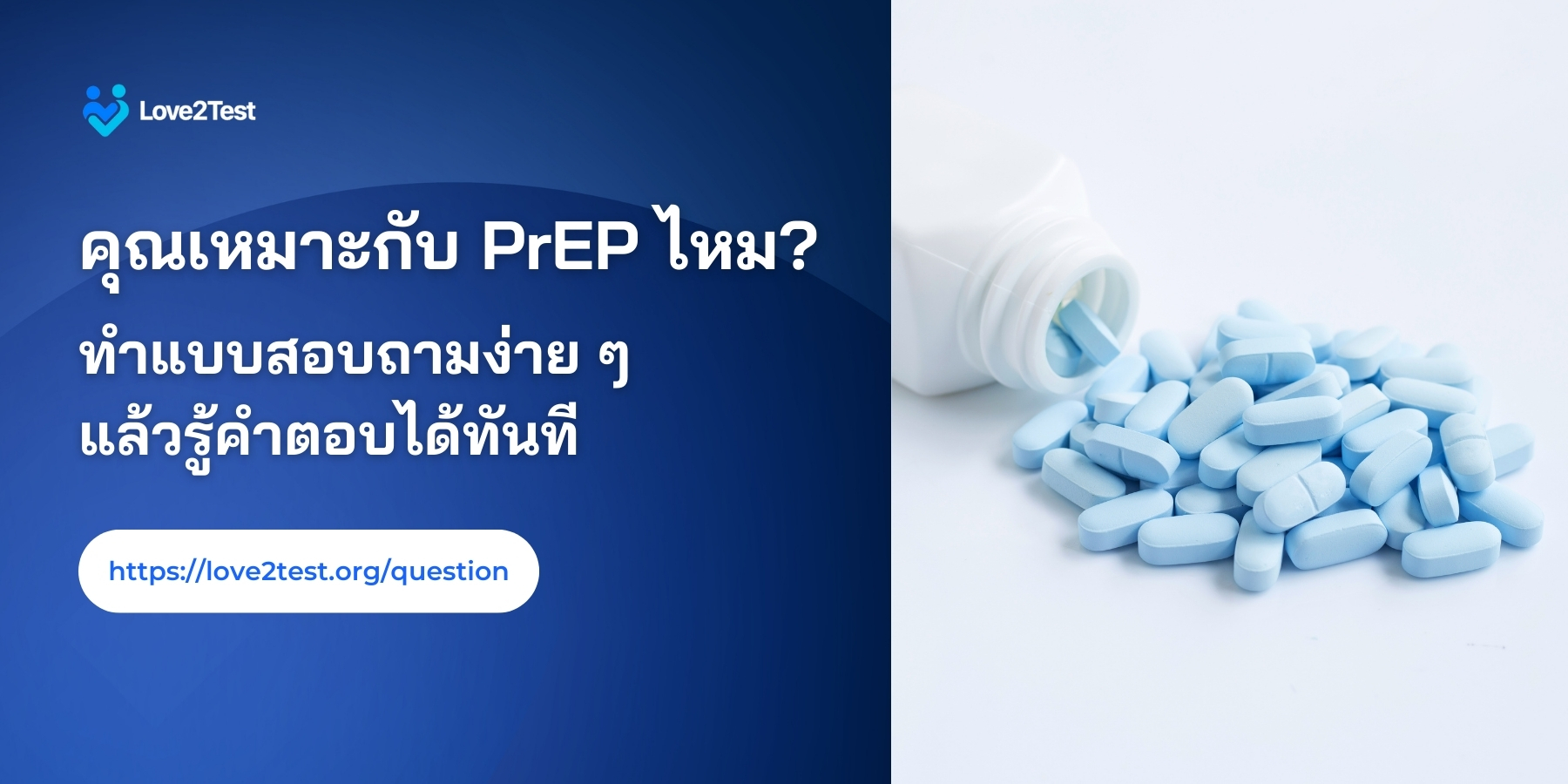
1. Injectable PrEP is More Convenient
One of the main reasons many people choose Injectable PrEP is convenience. Oral PrEP requires daily intake to maintain protective drug levels in the body, whereas Injectable PrEP only needs to be taken every two months.
- Ideal for those who frequently forget to take pills
- Missing oral PrEP doses can reduce its effectiveness in preventing HIV.
- Injectable PrEP eliminates this issue since the medication remains active in the body for two months.
- No need to carry medication
- Some people find it inconvenient to travel with PrEP pills or keep them at work.
- With injectable PrEP, you only need to visit a clinic every two months for a shot.
2. Injectable PrEP Offers High and Consistent Effectiveness
While oral PrEP is highly effective, its reliability depends on adherence. If doses are missed, drug levels in the body drop, which can reduce protection.
- Better efficacy for those struggling with daily pill intake
- Studies show that Injectable PrEP is more effective than oral PrEP in populations that have difficulty with daily adherence.
- The steady drug levels from injections prevent gaps in protection.
- No concerns about drug absorption
- Some people have digestive issues or take other medications that interfere with oral PrEP absorption.
- Injectable PrEP bypasses this issue by delivering the medication directly into the muscle.
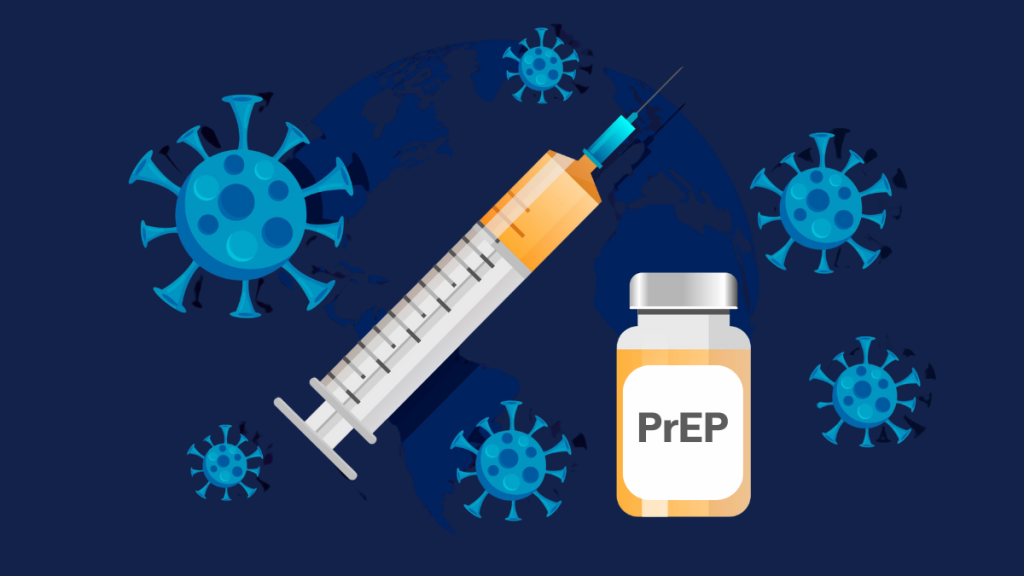
3. Injectable PrEP Offers More Privacy
Daily oral PrEP may feel like a burden to some people, and others may worry about discretion—not wanting others to know they are using PrEP.
- More privacy, less stigma
- No need to carry pills or worry about people noticing your medication.
- You only need to visit a healthcare provider every two months for an injection.
- Less stress about missing doses
- Some people feel anxious about forgetting to take their PrEP pill.
- Injectable PrEP removes this concern since drug levels remain stable in the body.
4. Reduces the Risk of Inconsistent Use and Drug Resistance
- Risk of inconsistent use with oral PrEP
- If oral PrEP is not taken regularly, the protective effect decreases.
- If someone contracts HIV while inconsistently using oral PrEP, the virus may develop drug resistance, making future treatments harder.
- Injectable PrEP helps prevent resistance
- The long-acting injection maintains consistent drug levels, reducing the risk of missed doses and resistance.
Is Injectable PrEP Available in Thailand?
As of January 31, 2025, the Thai Red Cross AIDS Research Center officially announced the availability of Injectable PrEP for registration. Additionally, Tangerine Clinic, a community health clinic for transgender individuals, has also opened registration for the service. This marks a significant step forward in HIV prevention efforts in Thailand.
How to Access Injectable PrEP in Thailand
Those interested in receiving Injectable PrEP can register at the following locations:
📍 Anonymous Clinic
Booking & Services:
Line ID: @091aojex
Phone: 02-251-6711-5 (ext. 611, 612) or 083-612-2623 (during office hours)
📍 Tangerine Clinic
Registration: Click here to register
Line ID: @PribtaClinic or @tangerineclinic
Phone: 02-160-5372 (Ext. 205 for Tangerine Clinic)
Important Considerations for Injectable PrEP
- Not a Vaccine: Injectable PrEP is not a vaccine against HIV. It must be administered every 2 months continuously. Missing doses or delaying injections may increase the risk of HIV infection.
- Does Not Protect Against Other STIs: Injectable PrEP only prevents HIV, but does not protect against gonorrhea, chlamydia, syphilis, or other sexually transmitted infections (STIs). Using condoms alongside PrEP is recommended for comprehensive protection.
- HIV Testing is Required Before Starting PrEP: Injectable PrEP is only for HIV-negative individuals. Those who are already HIV-positive should not take PrEP, as it may lead to drug resistance, making future treatment more difficult.
How Much Does Injectable PrEP Cost in Thailand?
Currently, there is no official government pricing for Injectable PrEP in Thailand, as the service is still in its early phase of rollout. However, the cost at available clinics is as follows:
- Anonymous Clinic: 14,900 THB
- Tangerine Clinic: 15,900 THB
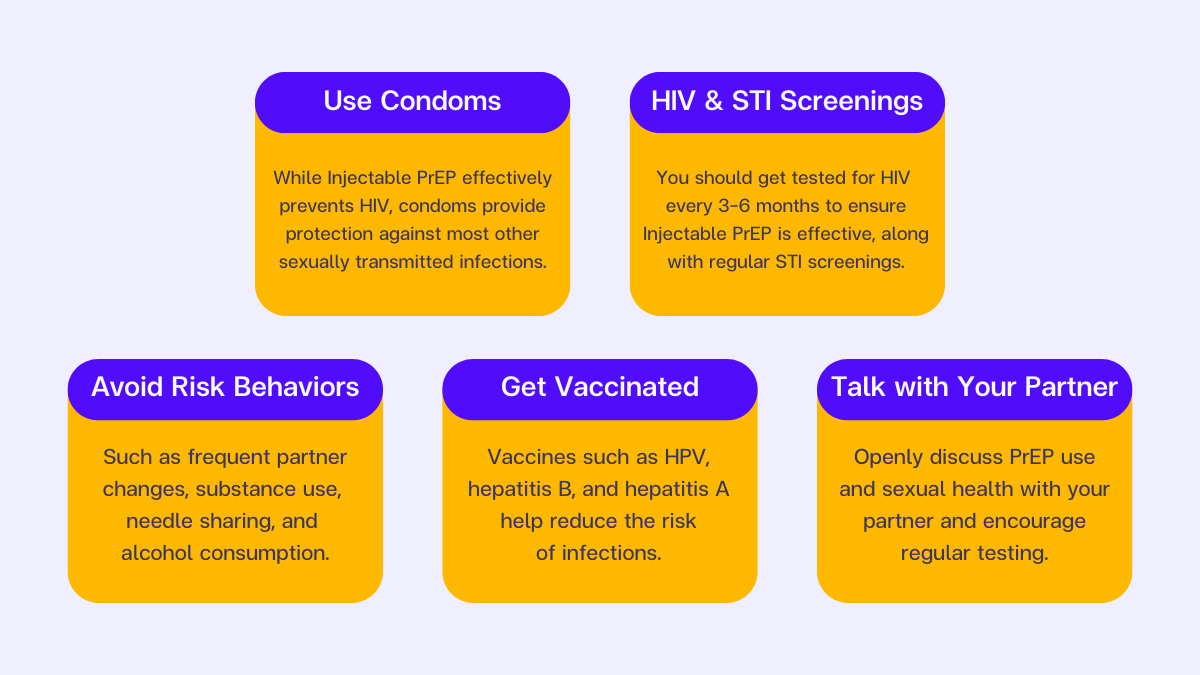
Should Injectable PrEP Be Used with Other Prevention Methods?
While Injectable PrEP is highly effective at preventing HIV, it does not protect against other sexually transmitted infections (STIs). To enhance protection and maintain overall sexual health, it is recommended to use additional prevention measures, including:
- Use Condoms Every Time You Have Sex: Although Injectable PrEP protects against HIV, condoms help prevent most other STIs.
- Prevents infections like syphilis, gonorrhea, herpes, hepatitis B, and hepatitis C.
- Reduces the risk of unintended pregnancy (for heterosexual couples).
- Provides extra protection if an injection is missed or delayed.
- Get Regular HIV and STI Screenings: Even if you are on Injectable PrEP, it is essential to get tested regularly to ensure you remain free from other infections.
- HIV testing every 3-6 months – Ensures that PrEP is working effectively and that you remain HIV-negative.
- Routine STI screenings – Helps detect and treat infections early to prevent transmission to others.
- Immediate treatment if an STI is detected – Reduces the risk of spreading infections to partners.
-
Avoid High-Risk Behaviors:
The best prevention strategy is to reduce exposure to potential infections.
- Limit multiple partners without condom use.
- Avoid substance use that may impair judgment, such as excessive alcohol or drug use.
- Never share needles or injection equipment to prevent HIV and hepatitis transmission.
- Get Vaccinated Against Preventable STIs: Several vaccines can protect against STIs and should be considered
- Hepatitis B vaccine (HBV): Prevents hepatitis B, which can be transmitted through sex.
- HPV Vaccine (Human Papillomavirus): Prevents cervical cancer and genital warts caused by HPV.
- Hepatitis A vaccine: Recommended for high-risk individuals.
- If you haven’t received these vaccines, consult a doctor to get protected.
- Communicate Openly with Your Partner: Discussing sexual health with your partner is key to maintaining safety and trust.
- Be open about using PrEP and other prevention methods.
- Encourage your partner to get tested regularly.
- Support each other in making informed decisions about sexual health.
Frequently Asked Questions About Injectable PrEP
After the first injection, it takes approximately 7 days for the drug levels to reach sufficient concentration to effectively prevent HIV infection.
🔹 For individuals engaging in anal sex (MSM/TGW): Full protection is achieved after 7 days.
🔹 For individuals engaging in vaginal sex: Currently, there is not enough data to confirm if protection is equally effective within the same timeframe.
💡 Recommendation: To ensure maximum protection, use additional preventive measures such as condoms during the first week after receiving the initial PrEP injection.
Injectable PrEP must be administered every 2 months to maintain consistent drug levels in the body. Missing an injection may cause drug levels to drop, increasing the risk of HIV infection.
🔹 If you are less than 2 weeks late:
- Get your injection as soon as possible.
- No need to restart the regimen.
🔹 If you are more than 2 weeks late:
- Consult a doctor before resuming injections.
- You may need to get an HIV test before restarting PrEP.
🔹 If stopping Injectable PrEP permanently:
- It is recommended to continue taking oral PrEP for at least 1 month after stopping injections.
- This ensures a gradual decline in drug levels, reducing the risk of HIV exposure.
💡 Tip: To avoid missed doses, set reminders for your next injection or schedule an appointment in advance.
If you decide to stop using Injectable PrEP, it is essential to follow a safe discontinuation plan. The drug levels in your body will gradually decrease, which could increase the risk of HIV infection if proper precautions are not taken.
Steps for Safely Stopping Injectable PrEP:
✅ Inform your doctor and get an HIV test before stopping.
- Ensures that you remain HIV-negative and can transition off PrEP safely.
✅ Switch to oral PrEP for at least 1 month after stopping injections.
- Helps maintain protection while the injectable drug levels decline.
✅ Use additional protection methods, such as condoms.
- Reduces the risk of HIV transmission during the drug clearance period.
⚠️ Stopping PrEP without a proper transition plan may increase your risk of HIV infection. If you are unsure about the safest way to discontinue use, consult a healthcare provider for guidance.
Related Articles
Currently, Injectable PrEP has been approved and is now available in Thailand through the Anonymous Clinic at the Thai Red Cross Society, with online pre-registration open for those interested. This marks a significant milestone in expanding HIV prevention options for the public.
While Injectable PrEP offers a convenient and highly effective alternative without the need for daily pills, there are important considerations, such as cost, the need for an injection every two months, and its inability to protect against other sexually transmitted infections (STIs). Therefore, combining Injectable PrEP with other prevention methods—such as condom use and regular health check-ups—can maximize protection and effectiveness.
If you are at high risk of HIV infection and interested in Injectable PrEP, it is recommended to stay updated with information from the Thai Red Cross Society or other relevant organizations for the latest details on service locations, pricing, and registration.
Injectable PrEP is an innovative advancement that makes HIV prevention easier and more accessible. However, the best protection comes from combining multiple preventive measures, ensuring a safer and more confident approach to sexual health.
Reference
PrEP แบบฉีด เปิดให้ลงทะเบียนแล้ววันนี้
- th.trcarc.org/prep-แบบฉีดเปิดให้ลงทะเบียน
ทางเลือกในการฉีดยาต้านไวรัสที่ออกฤทธิ์นาน
- ihri.org/th/through-udoms-lens-ep34/
Cabotegravir injections for PrEP
- aidsmap.com/about-hiv/cabotegravir-injections-prep
